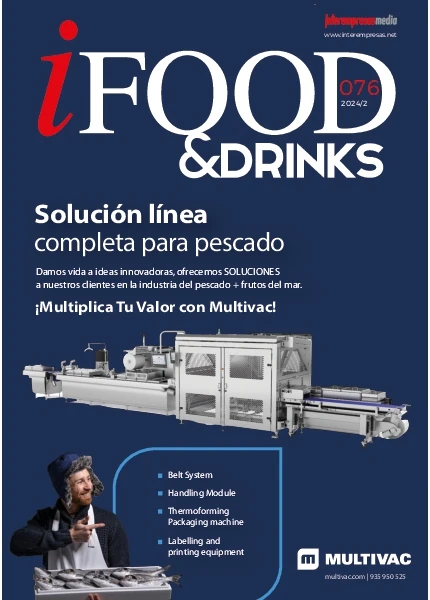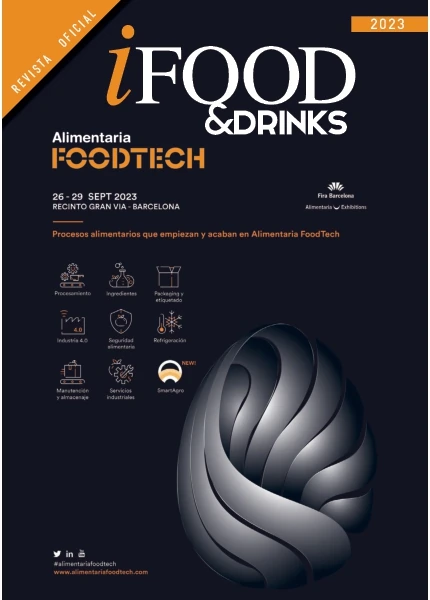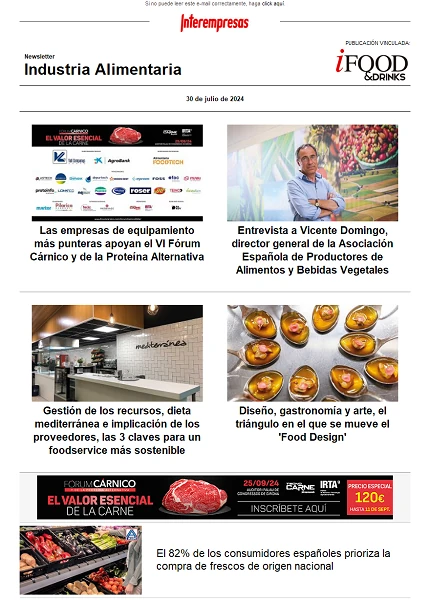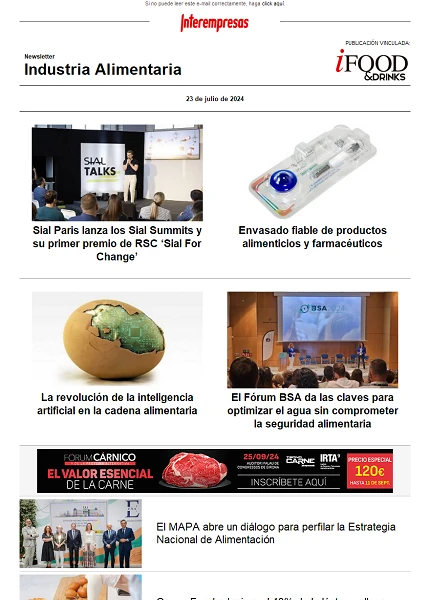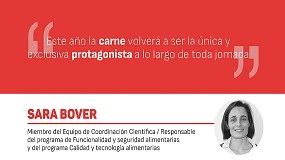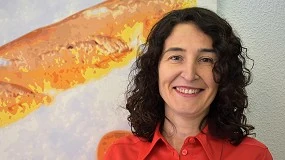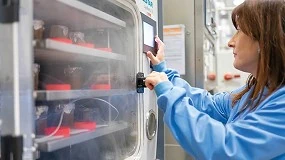Interview with Juan Manuel Vieites, Secretary general of Anfaco
November 20, 2009

Recently took place in Morocco the 30th meeting of the Committee of the Codex of fish and fishery products. Is has been able to get some kind of relevant conclusion after the meeting in Agadir?
At this meeting discussed the draft code of practice for fish and the fishing products (bivalve molluscs live and raw, lobsters and relevant definitions), the preliminary draft revision of the procedure for the inclusion of new species of fish in standards for fish and fishery products, and the draft standard for smoked fish, questions linked them all to the situation in the supply of pelagic to the processing industry of products of the sea, its marketing and the possible inclusion of new species in Codex standards.
On the other hand, have been significant advances in the State of processing of numerous rules in review, of great importance, who needed a boost to a State of processing close to its conclusion. For example, in relation to the methods for the determination of the bio-toxins, we have defended the Codex the suitability of the bioassay in mouse, from the experience of Anfaco-Cecopesca in investigation and control of marine biotoxins, the Rías Gallegas and of European origin and third countries by our experienceWe can say that in Galicia, the largest producer of bivalve molluscs of Europe region, official control system and the used reference methods have worked and work in a fully satisfactory manner.
However, we support the development of alternative methods, but once they tested and internationally validated according to a reliable protocol to ensure that they are able to offer the same level of protection of the health of the consumer, the bioassay in mouse. To continue in this line we continue to work on aspects such as availability of patterns or derivatives of the biotoxins for analogues of the bio-toxins and the criteria of effectiveness of the method.
What is based on the new standard to be applied to smoked fish? Do has it been also the inclusion of new species in standards for fish?
On the first topic we talked about a rule that affects a very diverse range of products that exists under rule smoked fish, and comprising the smoked fish ' cold' and ' hot' fish with smoke aroma and drying with smoke. In general we can say that development conforms with the Community rules developed for the management of specific risks of this range of products, hydrocarbons, listeria and parasites.
With regard to the inclusion of new species, it must adhere to the preliminary draft revision of the procedure for the inclusion of new species of fish in standards for fish, Codex standard in preparation. Our Association has actively participated in the development of this standard, to be important, given that establishes principles for the inclusion of new species adapt to justifiable criteria from the point of view of sustainability and, at the same time, rigorous scientific so not it payable in damage of competition between operators, under the principles of full and truthful information to the consumer. The draft in its current state of writing has reached a broad consensus among very different countries from inside and outside the EU.
This issue has been worked by taking advantage of the meeting 'ad hoc' maintained by the International Committee of the Pilchardus sardine (Cisap), with the participation of Anfaco. The main objective of the Cisap is to ensure the protection, identification and differentiation of canned sardines produced from the species 'Sardina pilchardus walbaum', in markets where market, especially in the European Union, which already has common marketing standards for canned sardines.
Speaking of numbers, is Spanish fisheries how is coping the crisis?
Taking into account the current economic and financial crisis, the future for the sector, as well as for many others is difficult in the coming years, but even so the Spanish canning sector of fish and seafood will continue betting on their competitiveness and looking for the Windows of opportunity that is offered to remain a modern sectorinnovative and internationalized, for facing the new situation of the world economy and try to win in this twenty-first century the challenge of the future.
Without a doubt, the fishing industry faces multiple fronts. Another very controversial for its operation, is that of ports. Spanish fishing ports work well?
The evaluation of the functioning of the Spanish fishing ports must be made taking into account infrastructure arranged therein to correctly address the volume of downloads and loads, in addition to human resources prepared by each of the public administrations with competences in these spaces, especially in the field of health control of food products from third countries. Depending on these variables, a port recorded a greater or lesser volume of activity, to be factors for competitiveness, notwithstanding that in response to the current situation of economic crisis should be considered also other factors that also affect the lower activity of our ports.
In this regard, and for reasons of geographical proximity, I can tell you that with regard to the port of Vigo, the volume of downloads of frozen fish and canned products from the sea during the year 2009, for the time being, presents a favourable evolution if we take into consideration the years 2008 and 2007which can be interpreted as a symptom of economic recovery, but at the same time as a symptom of recovery of the confidence in our port, especially if we take into account periods past, characterized by significant delays in the health inspection of food products coming from third countries.
In any case, this business organization has always shown its willingness to dialogue and collaboration with the competent administrations in the articulation of measures that contribute to the improvement of the competitiveness of the port infrastructures, and under such a premise continue to guide our action.
Despite the difficult times that has lived the fishing industry of our country, has always managed to recover. What strengths would you highlight today of our fleet and business?
Have Spanish companies involved in the processing of the fish invested enough in recent years in r & d in order to compete with our more immediate competitors?
Of course our society evolves over time and this affects the food industry and also to the canning industry. I refer to aspects such as the increase in single-person households, the increase in the average age of the population or the growing social awareness about the importance of a healthy diet, among others. We are of the opinion that these aspects should be see as an opportunity to bring to market new quality products that meet the needs of these groups, opening up new segments of the market through the bet by the technology.
The canning sector has given good indication of its ability to adapt to these social changes, developing innovative products that incorporate a value to a few raw materials already by itself are excellent.
It must not be forgotten that Spain is the largest producing country in the world in a variety of products and preparations preserved, all of this supported in the r & d, promoted since Anfaco and its technology center, Cecopesca.
What are the most immediate challenges facing the Spanish fishing?
The Spanish sector of the sea and aquaculture and their processed products, is located at the time, immersed in a series of changes and negotiations that undoubtedly will be the main challenges of their future to them must face, as it is the entrance on 1 January 2010 of the 'regulation against illegal fishing, not Reglamentada and not declared', as well as the reform of the common fisheries policy and the common organisation, the negotiations of agreements with third countriesthe ministerial Conference of WTO, etc.
In addition to ensuring the safety of our fleet, with effective measures what I ask to the central administration to revive an industry, such as that of the fish, which as we have said before always is on the razor's edge?
In this regard I must say that the Spanish and Community industry processing and canning of fishery products meets the most demanding control parameters, since the origin of the raw material to the preparation of the final product. Can not be the same in the case of products coming from third countries, which paradoxically more and have better conditions of access to the Community market, fuelled by the EU itself, as demonstrated with the granting of tariff preferences and repeal of rules of origin for Papua New Guinea through the partnership agreement of the Pacific.
Such decisions put to the Community industry, as you say, in the razor's edge, threatening its competitiveness and thus its future viability. It is unacceptable that the Community industry required you very high in higiénico-sanitarios, environmental aspects and social levels while imports from third countries of wide doors open to them.
High-volume market is today governed by the factor prices, while the market of high quality is a small segment. Our companies, with their present size, must be necessarily to the market of the high-volume, where it sends the price and there is where the lack of requirements to products from third countries in the areas outlined above enable them offer a product of the quality standards at a lower price. This makes that compete under these conditions it frankly difficult.
For this reason, we consider essential to suppress these preferential conditions and on the other hand to develop a rigorous quality control of products which are marketed in the EU in order to ensure the safety of consumers and ensure fair competition in the markets.


